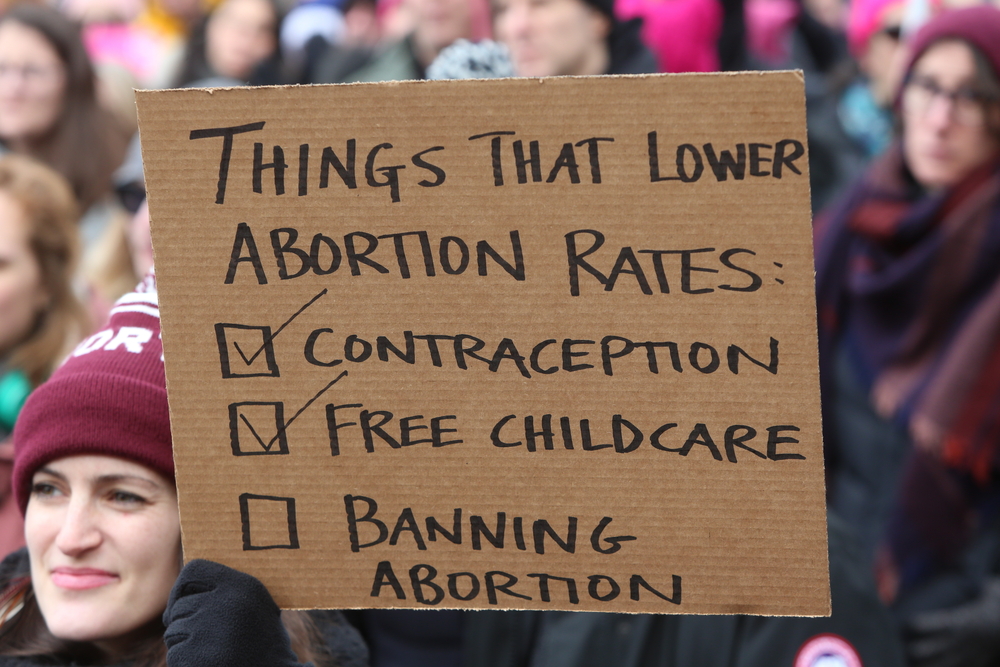
by Harshita Ganesh – Follow @harshikapoor17
I remember reading a quote on a Saturday night that read something like, “If you tell me that you cannot do something because your religion doesn’t allow it, then I won’t argue with you. But if you tell me that I cannot do something because your religion doesn’t allow it, then I will fight you.”
There is no other quote that more perfectly summarizes the Trump administration’s logic when it comes to reproductive rights. There are many aspects of the Trump administration that contradict the basic principles and foundations of the United States, but the one area where the contradictions are consistently pervasive are for reproductive rights.
Will we, as women, be able to control our own bodies? Will we, as trans women and queer women, be able to control our own bodies? With this administration, we most certainly will not.
It does not take a child to understand how anti-vagina this administration is. Vice President Mike Pence hates the idea of birth control. Steve Bannon, assistant to the President and White House chief strategist, thinks women are crazy when they are on birth control. And the majority of the Tea Party Republicans believe women are baby-birthing machines and should not use birth control. No, we are not waking up in the 1950s, but honey, it sure as hell feels like it.
The Trump administration hopes to defund Planned Parenthood under false narratives and impressions that the only thing this organization provides is abortions. Planned Parenthood is absolutely essential to many women living in poverty and many women who just cannot afford health insurance. Defunding the organization or even reducing the amount of money that is allocated towards Planned Parenthood can have devastating effects.
[Read Related: President Donald Trump Reinstates Anti-Abortion Rule Endangering the Lives of Women Globally]
But how does this affect South Asian females? South Asian women definitely do benefit from the existence and mere presence of this organization. South Asian women—more specifically young South Asian women—tend to face many barriers when it comes to modern contraceptive practices due to our conservative thinking on sexuality and sex.
Many young Asian women are having premarital sexual relationships and seek to improve preventative measures for pregnancies and STDs. Planned Parenthood provides young women of our community a safe haven for sexual counseling and education that, right now, many do not receive. Aside from young South Asian millennials, this family planning organization is a huge gift to other immigrant women. Free family planning clinics are a security to women.
“We have to repeal and replace the disaster known as Obamacare,” was one of Trump’s campaign promises that his supporters waved their USA flags to and cheered with unending ignorance. Women have a right to affordable healthcare, not to mention non-gender taxed healthcare. Obamacare helped accomplish something that was deemed next to impossible for many women — the ability to obtain health insurance with price equality. Before Obamacare, many women were charged up to 80% more for health insurance and could be denied health insurance due to pre-existing conditions, such as pregnancy and domestic abuse (yep, you heard that right).
The Affordable Care Act (ACA) brought women one step closer to equality and this is simply something that women across the board need to appreciate. Alongside eliminating the gender tax on health insurance, the ACA extended its benefits to maternity care. Prior to the ACA, the lack of coverage on basic maternal care was egregious and was another example of how America hurt women. The ability to have more affordable maternity care helped women advance in their careers and avoid getting sick. Before Obamacare, up to 30 million women could not afford basic preventative care measures. Now women are able to get mammograms, pap smears, STD testings, and many more aids for no out-of-pocket expense.
Yet the most popular benefit of Obamacare is the access to generic contraception for little-to-no cost. According to the IMS Institute of Healthcare Informatics, American women saved almost $483 million on birth control expenses in 2013. There are many more benefits to Obamacare that are essential towards our ability, as women, to stay healthy at an affordable cost.
After hearing white male conservatives speak on issues dealing with reproductive rights, it is pretty simple to deduce from the lack of education and the colossal amount of ignorance that they spew in their speech that it is time to pick up your pitchforks and rally your doctors. It is essential that women, and those who identify as female, make the extra effort to educate our representatives about reproductive rights. Drive your local representative crazy with your stories of why your reproductive and healthcare rights are important to you. Even if you are financially well-off, you should participate in this call to action because someone you know has probably sought help from one of those affordable family planning clinics and benefitted from the ACA.
This administration is hell-bent on making sure that women lose their basic right to choice. A woman’s autonomy starts with her ability to control her body. A woman’s confidence is built by her ability to control her body. A woman’s safety begins with her ability to control her body.
To advocate for reproductive rights, please call your congressman or congresswoman and let him or her know how passionately you feel. You can find the contact list here.
 Harshita Ganesh is a South Indian-Bollywood enthusiast; a princess who is here to fight patriarchy; a dancer; a pianist; and an explorer. Her main love is writing scripts on topics regarding empowerment and hopes to one day have one of her films made. She is currently an undergraduate engineering student in Europe and hopes to get a law degree soon after.
Harshita Ganesh is a South Indian-Bollywood enthusiast; a princess who is here to fight patriarchy; a dancer; a pianist; and an explorer. Her main love is writing scripts on topics regarding empowerment and hopes to one day have one of her films made. She is currently an undergraduate engineering student in Europe and hopes to get a law degree soon after.




